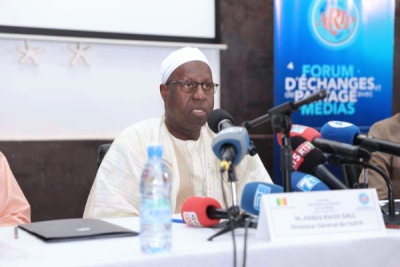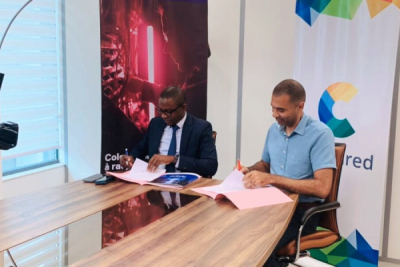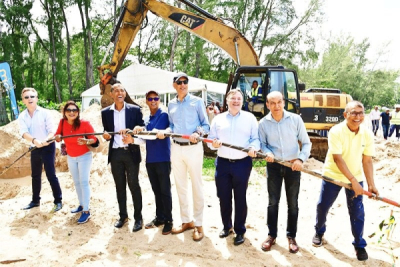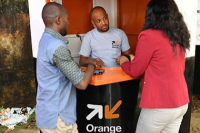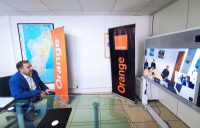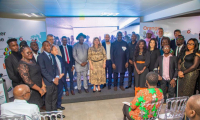
Telecom (150)
Orange launched Djoliba, West Africa's first pan-African backbone, in 2020 to support the digital ecosystem and meet the growing need for connectivity in the region.
Broadband connectivity provider Angola Cables and telecom operator Orange recently signed an infrastructure-sharing agreement on the West African Djoliba backbone. The collaboration allows Angola Cables to leverage Orange's Djoliba network to strengthen its presence in French-speaking West African markets.
“Access to the West Africa Djoliba network and our robust submarine infrastructure broadens the capability of businesses to access international markets and offers expanded traffic destinations across West Africa and other parts of the world,” said Rui Faria, Angola Cables’ global commercial director.
The Djoliba network was unveiled in 2020 by Orange. It is the first fully secured network in West Africa with more than 10,000 km of terrestrial fiber optic network, coupled with 10,000 km of submarine cable. It gives very high-speed offers (up to 100 Gbit/s) and a 99.99% availability rate. This network covers 16 points of presence with a mesh of nearly 155 technical sites and links 300 points of presence in Europe, America, and Asia.
Thanks to the agreement with Orange, Angola Cables will combine this new capacity with its global network of international submarine cables such as WACS, SACS, MONET, and EllaLink to offer secure, low-latency connectivity, digital and cloud services to businesses in the region.
The partnership is part of the strategy launched by Angola Cables in 2020 to increase partnerships and investments to meet the growing demand for broadband connectivity, in Africa and beyond.
Samira Njoya
Since 2020, Internet traffic and demand for broadband connectivity have been growing steadily in Africa. According to some institutions, IXPs could be a solution to localize traffic and improve connections.
The non-governmental organization "Internet for All" and the German company DE-CIX, in partnership with the Digital Development Agency (ADN), are set to launch Africa Congo Internet Exchange (ACIX), the largest Internet exchange in Central Africa, in Kinshasa today Monday.
“ACIX, Africa Congo Internet Exchange, provides an interconnection ecosystem for Central Africa to fulfill the growing interconnection needs of companies and end users – high-quality affordable connections for a better user experience, and for a more interconnected digital future,” ACIX explains in its “About” page.
The exchange is launched in the context of increasing Internet traffic across Africa, driven notably by digital transformation and new digital consumption patterns. According to the Internet Society (Isoc), Africa should invest more in Internet exchanges (IXPs) to improve connectivity on the continent and reduce access costs. To back its recommendation, in its report “Anchoring the African Internet Ecosystem: Lessons from Kenya and Nigeria’s Internet Exchange Points Growth,” the NGO indicates that Nigeria and Kenya boosted “the levels of Internet traffic that is locally exchanged from 30% to 70%” between 2012 and 2020 thanks to IXPs.
By enabling the local exchange of Internet traffic, IXPs save on large, recurring, and expensive international IP transit costs, reduce Internet costs, and significantly improve the quality and availability of connectivity, which in turn improves ISP revenues.
In that context, ACIX will be extremely useful. It is based in the DRC, the second largest country in Africa with nine border countries that have clearly stated ambitions for transnational and continental connectivity.
The exchange point is also part of the African expansion plan of the Deutscher Commercial Internet Exchange (DE-CIX), the world's largest Internet Exchange Point (IXP) in terms of traffic.
Samira Njoya
Senegal is poised to join the exclusive group of African nations that have already adopted 5G technology. In line with its drive to implement a successful digital transformation, the country aims to upgrade to ultra-fast internet connectivity to realize its objectives.
Senegal will effectively proceed to the commercial employment of 5G in July 2023. The date was announced by the director general of the telecom regulator ARTP, Abdou Karim Sall (photo), last Friday, during the 6th edition of a forum that brings together the regulator and media professionals.
"Before the end of July, we would have already completed the license awarding and extension process. [...] We have already discussed with operators and shown them the need to provide 5G in Senegal,” he said.
In December 2021, Sonatel carried out a second 5G test, confirming its ability to offer broadband services in the country. In June 2022, Free, its rival, launched an experimental phase with technical support from Ericsson. About a month later, in July 2022, Orange also inaugurated its first African Orange 5G Lab in the country.
In Senegal, the 5G technology is expected to help develop some economic sectors, including e-sport, a revenue-generating activity driven by the increasing availability of affordable mobile devices, improved Internet access, and the birth of online gaming platforms.
Africa has great e-sport potential, which can generate important revenues for companies that have the right marketing strategies. According to a report by Mordor Intelligence, the African gaming market is expected to grow at a compounded annual growth rate of about 12% between 2021 and 2026.
Senegal is one of the first Sub-Saharna African countries to have adopted a legal framework for the promotion of esports.
Samira Njoya
Low Internet penetration and growing demand for broadband have attracted many international and local investors to the Democratic Republic of Congo. To meet the population’s demand, companies are joining forces to develop common strategies.
Last Friday, tech company CSquared and data center management operator Raxio signed a memorandum of understanding to improve Internet connectivity in the Democratic Republic of Congo.
Yannick Sukakumu (photo, left), Raxio's general manager in the DRC, says the MOU provides the missing piece for Raxio to serve its customers in the country. It will allow CSquared DRC to connect the various Raxio data centers to offer quality internet to clients.
The partnership is part of Raxio's ambition to deploy several data centers to host IT equipment, and critical communication infrastructures, among others. For CSquared, this collaboration is part of a coherent strategy to expand its footprint across Africa in a context marked by high demand for broadband connectivity on the continent.
"By building infrastructure such as fiber optics and data centers and connecting them with existing technology solutions and services, we believe we are building an ecosystem” that will support the creativity of our youth, which is in dire need of such support, said Alain Malanda (photo, right), manager of CSquared DRC.
Samira Njoya
As of December 2021, the internet penetration rate was about 43% in Africa, according to the Internet Society. Some of the covered population do not even have access to quality internet. Nevertheless, telecom operators are beefing up their broadband infrastructure to better address this.
Mauritius Telecom, the largest Internet service provider and cellular service distributor in Mauritius, announced on Friday, March 24, that it has laid the T3 fiber optic submarine cable in Mauritius. The first end of the new infrastructure landed on Thursday, March 23, 2023, at the Baie-du-Jacotet landing station in the Bel Ombre region. The other end will land later this year in Amanzimtoti, KwaZulu-Natal Province, South Africa.
"With the rapid adoption of applications and services such as cloud computing, connected objects, video streaming, and others, it was essential for Mauritius Telecom to put in place the required infrastructure and capacity," said Kapil Resaul, CEO of Mauritius Telecom.
The 3,200 km long T3 cable has a capacity of 18 terabits per second, providing Mauritius Telecom with a more reliable, robust, and redundant network. It is scheduled to be commissioned by the end of 2023 and has an estimated lifespan of 25 years.
T3 is a partial takeover of the IOX submarine cable project that was to connect Mauritius to South Africa and India. First announced in 2017, it was abandoned in 2019. It will therefore join Mauritius Telecom's existing submarine cables, namely South Africa Far East (SAFE) and Lower Indian Ocean Network (LION), commissioned in 2002 and 2009 respectively.
Let’s note that Mauritius Telecom is 40% owned by Orange SA through Rimcom Ltd. Its remaining shareholders are the Mauritius government ( over 30%) and the local bank SBM (about 19%).
Samira Njoya
Burkina Faso, like several other African countries, is engaged in the digital transformation process. The country's ambition is to use digital technologies as tools to transform its society and accelerate socio-economic development.
The government of Burkina Faso has selected Bridge Fiber Solutions (BFS) to operate and manage the country's national telecommunications backbone. The company launched its commercial activities in Ouagadougou on Friday, March 10 in the presence of the Minister of Digital Transition, Posts and Electronic Communications, Aminata Zerbo-Sabané (photo, center).
Speaking about this new step towards an effective digital transition, Aminata Zerbo-Sabané said that "the government has made an important investment by building this national backbone that connects the entire territory with fiber optics and gives access to high-speed internet [necessary] to accelerate digitalization to businesses and the public administration.”
With the government's approval, BFS becomes the sole manager of the public backbone network in Burkina Faso. In that light, it will provide telecom companies and other entities with various services such as capacity leasing, dark fiber leasing, wavelength leasing, duct leasing, and Internet access. It will also invest in the modernization and extension of the network as needed.
The national telecommunications backbone project was launched in 2016 to develop national and international connectivity by interconnecting the country’s 45 provinces with a 3,000 km long optical fiber.
According to BFS director general Boris Compaoré, the launch of BFS is the beginning of a long process that aims, in the short term, to reduce the digital divide and offer quality Internet and favorable conditions to various digital companies and the administration at very competitive rates.
Samira Njoya
Mining is a key sector in the South African economy. It is therefore important to digitize and simplify processes and provide new solutions for the sector.
Last Thursday, Swedish IT company Ericsson announced an agreement to provide its “Ericsson Private 5G” solution to global simulation software specialist Comsol in South Africa.
The combination of Ericsson's high-end connectivity solution and Comsol's mining and systems integration expertise will provide the mining industry with robust standalone 4G/LTE and 5G connectivity, and help Comsol's customers optimize and simplify business operations through data creation, collection, and analysis.
“We are thrilled to offer Comsol our pre-packaged and pre-integrated private network solution, Ericsson Private 5G. With its reliable, fast, and secure connectivity, Comsol’s customers will have the platform to enable innovative smart solutions for better operational efficiency and safety,” commented Todd Ashton (photo, left), Vice President and Head of Ericsson South and East Africa at Ericsson Middle East and Africa.
The agreement gives Comsol the right to resell the Ericsson Private 5G high-speed wireless network solution. It will enable Comsol to expand its corporate activity within the local mining sector, which is one of the key investment sectors in South Africa.
The country is the world's largest chrome and platinum producer. The latest Statistics South Africa (Stats SA) data on mining production shows that total production has increased by 11.2% in 2021 compared to 2020. In that key sector, “Comsol will utilize the PoC solution to experiment and test various use cases for mining and other industries, including Augmented Reality, Autonomous Vehicles, and Fixed Wireless Access.”
Samira Njoya
Digital transformation is gaining momentum around the world since 2020. It is forcing telecom operators in various markets to rethink their business approaches to better meet new consumer needs.
Last Thursday, telecom group Orange unveiled its 2025 strategic plan. The plan, dubbed "Lead the future", focuses on four major points to achieve operational excellence for increased profitability.
Orange thus plans to improve its service quality by introducing more innovative offers that will enhance customer experience. It will also invest in more robust and innovative network infrastructures to provide access to quality telecom services to as many people as possible and strengthen its presence in the Enterprise segment (cybersecurity in particular). It will also take actions to keep growth momentum in the Middle East and Africa.
In Africa in particular, Orange plans to keep rolling out fixed and mobile networks (4G and 5G) to support socio-economic development, and at the same time maintain its strong results on the continent.
The group will accelerate the transformation of Orange Money to a digital platform model that will offer services beyond transfers and payments. The service will be offered to all consumers, whether Orange customers or not, in all countries where the group operates. By the end of 2022, the company reported strong growth in its subscriber base. With more than 29 million active users, it recorded more than EUR100 billion worth of transactions that year.
The telecom company will also continue to strengthen its local presence and its position as a multi-service operator through the deployment of its "Orange Digital Centers". The group will also invest in staff training to facilitate its employees' transition towards new professions in data, cloud, cybersecurity, or AI.
According to the plan, social and environmental responsibility is a priority for Orange in all of its markets. Through an ambitious program, the telecom group is committed to fighting global warming through its CO2 emissions reduction program. The aim of that program is to reduce the group's carbon emissions by more than 30% by 2025 and by 45% more by 2030.
Muriel Edjo
Orange Madagascar is stepping up investments in rural infrastructure to bring mobile services to the unconnected half of the Malagasy population. The company signed an agreement in January with NuRan Wireless to build 500 new telecom sites over ten years.
Telecom operator Orange Madagascar has signed an agreement with telecom tower builder Africa Mobile Networks (AMN) to further expand its network coverage in rural areas in Madagascar. Under that agreement, the two partners intend to deploy at least 500 base stations under the Network-as-a-Service (NaaS) model over the next ten years.
The sites to be built under this project will support both 2G and 3G. Their deployment has already begun and some are expected to be operational by the end of 2023, we learn.
The partnership comes about a month after Orange Madagascar signed a similar agreement with Canadian company NuRAN Wireless to deploy 500 telecom sites on Madagascar's east coast, as part of its strategic goal to establish itself as the leading digital service provider in the country.
The investment in rural areas is expected to accelerate Orange Madagascar's ambition, as these areas have a high concentration of unconnected people, and therefore potential telecom subscribers. According to the Communication Technology Regulatory Authority (ARTEC), only 46.38% of the Malagasy population has access to mobile telecom services. The project is expected to enable the telecom operator to reach more than one million new subscribers.
It is also expected to support AMN's ambition to help expand the mobile network in rural areas in sub-Saharan Africa with the deployment of 10,000 towers by 2025. In November 2022, it secured US$20 million from Finnfund and BlueOrchard Finance to fund that plan.
Isaac K. Kassouwi
The new digital center is the 14th launched by Orange. The 13th was inaugurated in Guinea last December.
Last Friday, telecom group Orange and German Cooperation agency GIZ inaugurated "Orange Digital Center" (ODC) Sierra Leone, the 14th ODC in the Middle East and Africa.
The digital infrastructure, based in Freetown, spans over 500m². Like the previous 13 similar infrastructures, it hosts Orange group's four strategic programs including notably a coding school, a fab lab (FabLab Solidaire), a startup accelerator (Orange Fab), and a venture capital fund (Orange Ventures Afrique et Moyen Orient), which invests in promising startups that emerge from the ODC.
According to Brelotte Ba, Deputy CEO of Orange Middle East and Africa, the 14th Orange Digital Center "is part of a network of 32 Orange Digital Centers that will be deployed not only in Africa and the Middle East but also in Europe by 2023." "The objective is to democratize access to digital technology for young people – with or without qualifications. We want them to be part of the digital transformation of their country by encouraging them to become digital entrepreneurs, to create local content and thus develop the digital economy of Sierra Leone," she added.
The digital infrastructure comes at an opportune time for Sierra Leone, which recently began implementing its national digital transformation project with a US$50 million grant from the World Bank. Orange's hands-on initiative supports the government's push to leverage digital tools for job creation, skills development, and the development of new opportunities.
The center will offer free digital training to students and deploy Orange Digital Center Clubs in selected universities, complementing the education system to "give as many people as possible access to new technologies and support them in using these technologies to their full extent."
For Jens Kraus-Massé, German ambassador to Sierra Leone, the "aim is to empower every woman, every girl, every man, and every boy no matter from what background, to take advantage of the opportunities of digitalization, to get better jobs and eventually a better life for them and their families."
Samira Njoya
More...
In 2022, telecom networks were seriously disrupted in Cameroon. In that context, with the investments, Orange wants to develop its services to fully satisfy its subscribers.
Orange, one of the leading telecom companies in Cameroon, will invest XAF150 billion (US$252 million) over the next five years to secure, expand and modernize its network infrastructure. The investment plan was announced by the operator's executives during a meeting with the local telecom regulator ART's officials last Tuesday.
According to Patrick Benon, CEO of Orange Cameroon, the investment will ensure improved service quality and network coverage in some areas not yet covered by Orange Cameroon. It will also allow the development of more innovative solutions, he added.
Of the XAF150 billion investment announced, XAF30 billion will fund the digitalization of service processes, and service platforms notably. The aim is to make the platforms more flexible and easy to use so that their integrated offers, services, and applications can be easily used but also streamline the after-sales service pathway to provide an improved customer experience.
Patrick Benon explains that during the meeting with the ART, Orange made firm commitments to improve its service quality this year.
It should be noted that this meeting is part of the consultation initiated by the ART to address the challenges that prevent the development of the telecom sector in general, and the digital economy in particular, in Cameroon. It follows a seminar organized (with support from the Ministry of Posts and Telecommunications) in Yaounde, in December 2022, to discuss the quality of telecom services.
Samira Njoya
The internet service provider currently operates in 15 counties but, it plans to add 10 more counties to its network, therefore providing services to over 250,000 Kenyans over the next five years.
recently announced the closing of its US$9 million Series B funding round. It raised US$6 million fromInfraCo Africa's investment arm and US$1.5 million from E3 Capital and the same amount from the Dutch Entrepreneurial Development Bank FMO.
"Mawingu’s aim is not to simply drop an Internet cable at someone’s house. We seek to help our customers access new opportunities for work, education, entertainment, and social connections through the power of the internet," said Mawigu's CEO, Farouk Ramji.
Since 2012, Mawingu has been providing internet services in Kenyan rural and peri-urban areas. In late 2022, it was claiming over 7,500 active users and more than 300,000 hotspot users across the country.
Its ambition is to give internet access to 100 million Africans. For Claire Jarratt, InfraCo Africa Chief Investment Officer, Mawingu contributes to economic development by providing internet access to populations. "As our first telecoms investment, Mawingu appealed to us as its services are designed to provide affordable internet access tailored to the needs of underserved rural customers," she said.
Samira Njoya
Starlink, the satellite constellation operated by Elon Musk's SpaceX, launched its satellite internet services in Nigeria yesterday, January 31. Its aim is to provide a fast and reliable internet connection to users.
On Twitter, the company announced that Nigeria is the first African country to be able to use SpaceX's network. It also indicated that the service will launch, this year, in several other African countries, including Mozambique, Kenya, and Angola. South Africa was also supposed to welcome the satellite internet services this year but, in August 2022, SpaceX dashed the hopes by updating its rollout plan.
The project, which is almost completed, will reinforce Senegal's position as an ICT hub in West Africa and accelerate the development of the region's digital and innovative ecosystem.
Senegal Horn of Africa Regional Express (SHARE), the optic fiber interconnection project connecting Senegal and Cabo Verde will soon be completed, according to Cheikh Bakhoum (photo), director general of the state IT agency. The official made this revelation last Friday, during a press briefing.
"We have deployed nearly 95 % of the subsea cable SHARE connecting Senegal and Cabo Verde, two West African countries, [...] The cable will allow access to a better internet connection of up to 16 terabits in the future in Senegal. Once the cable becomes operational, 100 gigabits will be available for the administration and for operators who will need large internet capacities," he said.
The 720-kilometer cable will have landing points in Dakar and Praia. The broadband infrastructure, deployed by Huawei Marine Networks (HMN), will be the first direct link between Africa and Cabo Verde islands, which are located are located approximately 570 kilometers off the coast of Africa in the Atlantic Ocean.
The project funded by Senegal will introduce an upgraded international bandwidth route to West Africa. According to Cheikh Bakhoum, it will probably be inaugurated in the next few months as works are being accelerated.
Samira NJOYA




